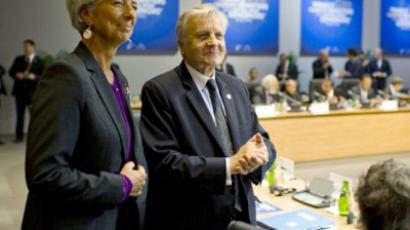EU financial crisis – The key questions

With the Eurozone leadership needing to unveil a ‘grand plan’ to deal with the European financial crisis, the news that they need to delay until at least mid-next week is raising fears that they are simply trying to bridge the unbridgeable.
The Key issues they need to deal with are: Greece – Greece has slipped on implementing reforms to try and bring its budget under control, but ultimately it is burdened by crippling debts, and the austerity has already pushed Greek society and politics close to buckling, with the country looking at a debt to GDP ratio next year of more than 170%.The plan needs to identify what level of restructuring of Greek debt can be achieved, meaning private holders of Greek debt (mainly European banks) are looking at a far bigger haircut than the 21% they grudgingly accepted in July.Recapitalizing Eurozone banks – Europe’s banks have largely resisted recapitalizing since the financial system meltdown of 2008.Now they will be forced to.Haircuts on Greek debt will leave large holes in balance sheets.Europe’s banks need to either cover this through recapitalization or shrink their operations.If they recapitalize the question becomes one of how.It will be a tight market for private investors with potentially a large number of banks all looking to recapitalize at the same time.That leaves either national treasuries or the EFSF as potential sources of funding – either carries profound implications.Using national treasuries will add to burdens of national treasuries under extreme pressure already, or in other cases add to ratings downgrade concerns.The current EFSF, €440 billion, isn’t big enough to handle the bank recapitalization need as well as sovereign debt.Enlarging the EFSF – with as much as half of the existing EFSF probably allocated to Greek Portuguese and Irish bailouts it is in no position to handle debt market stress in Spain or Italy.It needs to be enlarged.The problem is that if it is leveraged with the ECB used as a backstop (which is currently being resisted by Germany and the ECB) then that is a step closer to monetizing debt.If it is enlarged with national contributions then that adds massively to the likelihood of credit downgrades of contributing nations, as well as adding massively to debt burdens of already stressed nations.If they don’t enlarge the EFSF then the risk of contagion as investors flee the Spanish and Italian debt markets (in particular – bearing in mind their yields have nudged back over 6% this week) potentially crippling economies already in recession, mounts.But beyond these 3 issues there are others that Eurozone leaders need to address, including:-Economic growth – handling financial system crises would be easier if there was some sort of economic growth on the continent. The two powerhouses of the Eurozone economy, France and Germany, were close to dead in the water according to 2Q data.Much of the rest of Europe is in outright contraction, with unemployment and social discord rising.The Euro – It may be the one tangible achievement of the European dream, but at the moment it is a dead weight on the capacity of Mediterranean economies to generate growth.The ECB has done an admirable job of sticking to its mandate of making sure that inflation expectations are constant.Departing Head, Jean Claude Trichet, has always been clear that the Eurozone crisis needs a political response and portrayed himself as an administrator operating under instruction.But ultimately it was raising interest rates until early this year, which must have aggravated the recessions being hammered into the Eurozone periphery.Fiscal transfers – Either there is a treasury behind the Euro or there isn’t.The current situation where there has been a loose agreement for national treasuries not to go beyond certain limits (which have been fairly openly flouted) has been exposed.There needs to be a decision that there will be fiscal transfers between nations, and an agreement on what this means at a political level, or agreement that there will be none, which ultimately brings into question the very viability of the Euro as a currency.














